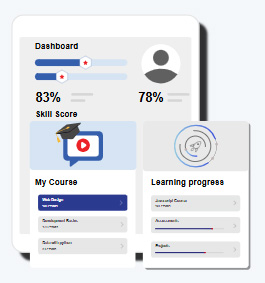C++ Online Training
C++: refers to an object-oriented, high-performance programming language that extends the C language by adding features like classes, objects, inheritance, and polymorphism.

- Learn & practice Course Concepts
- Course Completion Certificate
- Earn an employer-recognized Course Completion certificate by Ziventra.
- Resume & LinkedIn Profile
- Mock Interview
- Qualify for in-demand job titles
- Career support
- Work Support

C++ Training Content
You will be exposed to the complete C++ Training course details in the below sections.
Topic-wise Content Distribution
Introduction to C++ and Programming Fundamentals
- Introduction to C++
- Paradigms of Problem Solving
- POP vs OOP
- Features of OOP
- Concepts of:
- Object
- Class
- Abstraction
- Encapsulation
- Inheritance
- Polymorphism
- Dynamic Binding
- Message Communication
Basic Syntax and Operations
- Constants, Variables, Keywords
- Data Types & Variable Declarations
- Input/Output:
- cin, cout, manipulators
- Comments
- Operators:
- Arithmetic, Relational, Logical, Assignment
- Compound Assignment, Increment/Decrement
- Bitwise, Shift, Conditional, Type Casting
- Address, Comma, Pointer, Sizeof, new, delete
- Scope (::, .*, *::)
Control Structures and Flow Management
- Conditional Statements:
- if, if-else, nested if-else, if-else-if ladder
- Multi-branching:
- switch-case
- Looping:
- while, do-while, for, nested loops
- Jump Control:
- break, continue, goto, return
Arrays, Strings, Structures, and Pointers
- Arrays
- Strings
- Structures
- Pointers
- Dynamic Memory Allocation using new and delete
Functions in C++
- Defining, Calling, and Returning from Functions
- Function Prototypes
- Scope and Reference Variables
- Recursion
- Parameter Passing:
- Call by Value, Address, Reference
- Function Overloading
- Default Arguments
- Inline Functions
Classes and Objects
- Defining Classes and Creating Objects
- Access Specifiers
- Accessing Members
- Scope Resolution Operator
- Member Functions (Inside/Outside Class)
- Member Function with Arguments
- this Pointer
- Object as Argument/Return Value
- Array of Objects, Pointers to Objects, Dynamic Objects
- Friend Functions and Classes
- Composition (Container and Contained Classes)
- Sample Programs (Student, Employee, Matrix, etc.)
Constructors and Destructors
- Introduction and Properties
- Types:
- Default, Parameterized, Copy
- Constructor Overloading & Default Arguments
- Destructors
- Differences:
- Constructor vs Member Function
- Constructor vs Destructor
- Static Data Members & Functions
- Constant Data Members & Member Functions
Operator Overloading
- Defining Overloaded Operators
- Overloading:
- Unary & Binary (using member/friend functions)
- <<, >> stream operators
- Practical Programs
Inheritance in C++
- Base & Derived Classes
- Protected Access Specifier
- Types of Inheritance:
- Single, Multiple, Hierarchical, Multi-Level, Hybrid, Multi-path
- Constructors and Destructors in Derived Classes
Polymorphism and Virtual Functions
- Static vs Dynamic Binding
- Virtual Functions
- Pure Virtual Functions & Abstract Classes
- Virtual Destructors
- Function Overriding
- Accessing Members via Pointer
Templates in C++
- Function Templates
- Function Template Overloading
- Class Templates
- Inheritance in Class Templates
- Benefits and Applications
Exception Handling
- Types of Errors
- Benefits of Exception Handling
- Keywords: try, catch, throw
- Exception Objects, Nested try blocks
- Catching All Exceptions, Rethrowing
File Handling in C++
- File Stream Classes
- Opening and Closing Files
- End-of-File Detection
- File Pointers and Manipulation
- Sequential and Random Access Files
Input/Output Streams
- I/O Stream Class Hierarchies
- Unformatted I/O:
- get(), put(), getline(), write()
- Formatted I/O:
- width(), precision(), fill(), setf(), unsetf()
- Manipulators:
- endl, ends, setw(), setfill(), setprecision(), setiosflags(), setbase(), resetiosflags()
- User-defined manipulators
Standard Template Library (STL)
- Containers:
- vector, list, deque, array, forward_list
- stack, queue, priority_queue
- set, multiset, map, multimap
- Algorithms:
- Sorting, Searching
- Partition & Utility Operations
Request More information
Hands on C++ Projects
Our C++ Training course aims to deliver quality training that covers solid fundamental knowledge on core concepts with a practical approach. Such exposure to the current industry use-cases and scenarios will help learners scale up their skills and perform real-time projects with the best practices.
Training Options
Choose your own comfortable learning experience.
On-Demand Training
Self-Paced Videos
- 30 hours of Training videos
- Curated and delivered by industry experts
- 100% practical-oriented classes
- Includes resources/materials
- Latest version curriculum with covered
- Get one year access to the LMS
- Learn technology at your own pace
- 24×7 learner assistance
- Certification guidance provided
- Post sales support by our community
Live Online (Instructor-Led)
30 hrs of Remote Classes in Zoom/Google meet
- Live demonstration of the industry-ready skills.
- Virtual instructor-led training (VILT) classes.
- Real-time projects and certification guidance.
For Corporates
Empower your team with new skills to Enhance their performance and productivity.
Corporate Training
- Customized course curriculum as per your team’s specific needs
- Training delivery through self-Paced videos, live Instructor-led training through online, on-premise at Mindmajix or your office facility
- Resources such as slides, demos, exercises, and answer keys included
- Complete guidance on obtaining certification
- Complete practical demonstration and discussions on industry use cases
Served 130+ Corporates

Our Training Prerequisites
Prerequteis Of C++ Online Training :
- Basic Computer Knowledge
- Comfortable using a computer (Windows/Linux/Mac)
- Familiar with installing software and navigating file systems
- Understanding of Programming Basics (Optional)
- Prior knowledge of any programming language (like C) is helpful but not mandatory
- If you’ve worked with C before, transitioning to C++ will be smoother
- Logical Thinking & Problem Solving
- Basic reasoning and logical thinking skills are recommended
- Familiarity with math or algorithmic thinking can be an added advantage
- Technical Requirements
- A PC or laptop with at least 4 GB RAM
- Stable internet connection for accessing training content and live sessions
- C++ compiler (like GCC, Turbo C++, or Code::Blocks) – installation guide included in the course
Talk to our team directly
Schedule A Free Consultation
